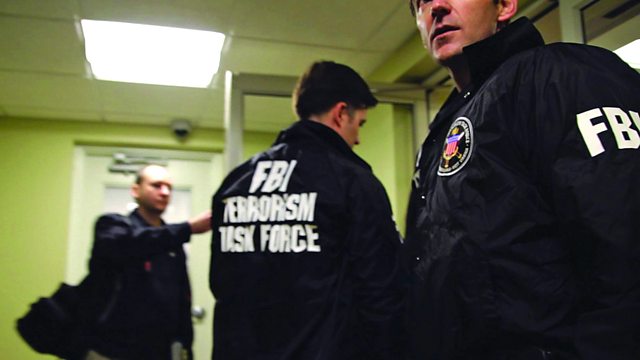
FBI Undercover
Documentary which follows an unfolding active FBI counterterrorism sting operation, telling the story of Saeed 'Shariff' Torres, a former Black Panther turned informant.
With remarkable access, this documentary follows an unfolding active FBI counterterrorism sting operation, telling the story of Saeed 'Shariff' Torres, a 63-year-old former Black Panther turned informant for the Federal Bureau of Investigation.
Shariff is an ex-convict who claims to have at one point made hundreds of thousands of dollars a year sidling up to Muslims accused of pro-terrorism leanings. From a rented Pittsburgh home he receives instructions by text from his FBI handler. He's told to befriend a white Muslim convert who has publicly made pro-terrorist statements.
As the documentary observes Shariff closing in on the suspect, viewers get an unfettered glimpse of the government's counterterrorism tactics and the murky justifications behind them. Taut, stark and controversial, the film illuminates the fragile relationships between individual and surveillance state in modern America, and asks who is watching the watchers.
Last on
More episodes
Previous
Clip
-
![]()
"These are all targets"
Duration: 01:22
David Felix Sutcliffe, director of FBI Undercover, answers the Storyville Q&A

I kind of feel that each film has their own internal hierarchy, a balance of priorities and momentum that fluctuate between story and character. The process of viewing a film, a good one, should lead you deeper into each, and also surprise you along the way.
What made you first want to explore the subject?
There are 15,000 informants working for the FBI. They're untrained, unregulated and many of them are former criminals. And they're being paid hundreds of thousands of dollars to protect America from supposed terrorist threats. Meanwhile, the public knows nothing about these stings, or how the FBI is using these informants.
How long did it take to get the film off the ground?
Lyric first met the film's main subject, Saeed "Shariff" Torres in 2002, as a journalism student at Columbia University, while living in a brownstone in Harlem, New York. Saeed was her downstairs neighbor and over time she developed a relationship with him, talking about current affairs, politics, as well as his involvement in the Harlem chapter of the Black Panther Party for Self Defense. In 2005, he confessed to her that he was an FBI informant. Although he initially wanted her to write a book about his experiences, she declined, wanting to learn more about these issues, and the world that Saeed occupied, before endeavoring to tell his story. In the meantime, she made sure to keep in contact with him, and from 2005-2011, she would call him once a month, asking simply “How are you and where are you? Shortly after Saeed's confession, Lyric and I - David - met at an afterschool arts program where we both taught. At the time, I was working on ADAMA, a documentary about a student at the after-school program.
The film explored the story of Adama Bah, a 16-year-old Muslim girl from Harlem, who had been arrested by the FBI on suspicion of being a “potential” suicide bomber. While working on ADAMA, I noticed the vast majority of the terrorist plots “discovered” by the government seemed, in fact, to be created by FBI informants, working at the direction of their superiors at the Bureau. Though I was interested in learning more about these cases, and the relationships that developed between FBI informants and the men they were attempting to set up, I never seriously pursued the idea, due to the obvious challenge of locating someone who is, by definition, anonymous. In the fall of 2011, I offhandedly mentioned to Lyric my desire to make a film about an informant. She subsequently informed me of her relationship with Saeed, at which point we discussed reaching out to him to explore whether he'd be willing to in participate in a film. When she contacted Saeed to explore the idea, he said that he was interested, and that we should come to his house to discuss the idea further...
What were you most surprised to learn in the course of production?
Saeed, our main character, continues to upend my expectations. He's a complex man, whose choices have had devastating consequences on other people's lives, and on an entire community. But it's not my place to judge him. Lyric often says 'Hate the sin, not the sinner.' I think this is a helpful reminder, and one that has preserved a critical depth in our film. The intimacy of Lyric's relationship with Saeed allows an opportunity for the audience to empathize with him, and also gives us space to take a step back and consider the bigger picture. Ultimately, Saeed is a small part of a much larger system. Yes, he's made mistakes but, like many other informants, he's been manipulated by the FBI - and in turn, he manipulates his targets. It's a vicious and outrageous cycle that the FBI presents as "national security." It's a charade, it's not making us safer, and it's had devastating consequences on the Muslim communities.
What have been the differences in reception to the film in countries it has now travelled to?
Surprisingly, other countries have been particularly curious about the film. Initially, we wondered if the film would be too specific to American issues to be of concern to other audiences. However, our film has been invited to screen at a far-reaching range of festivals in Denmark, Mexico, South Korea, New Zealand, to name a few. I suspect that in the current global climate, the story's exploration of the FBI's controversial tactic is of increased concern to citizens who fear the expansion of government powers, and the erosion of their civil liberties.
Which documentary has most inspired you?
Seeing Laura Poitras’ MY COUNTRY MY COUNTRY at Manhattan’s Cinema Village in August of 2006 was a pivotal moment in my life, not just as a filmmaker, but as an American. I stumbled out of the theater in a state of total discombobulation - disgusted by the American occupation of Iraq, yet deeply inspired by Dr. Riyadh, the film’s central character, and his commitment to the possibilities of democracy. At the time, I don’t think I could have articulated why that film was so important to me, why it affected me on such a core level. Now, a few years later, I recognize that its impact was directly tied to my own efforts to make my first film, and my desire to achieve the same balance that exists so beautifully in My Country My Country. I’m not referring to “journalistic balance”, but instead, to the balance between love and rage. Watching My Country My Country, it is abundantly clear that she, as a filmmaker, has so much love and respect for her central character, as well as his family; and yet her portrayal of them never slips into sentimentality. As we witness the chaos that engulfs him and his country, and come to understand the vast idiocy, incompetence, and indifference that is the source of that chaos, the film begins to sound a silent piercing note of rage.
Favourite Website/blog?
In terms of journalism, I really like what AJ Plus is doing. Not exactly a website, or a blog, but something that has successfully entered into the public space to offer pithy and digestible pieces of progressive and global information. As for long format, I think Field of Vision is hosting some really interesting, alternative vantage points on current social and political issues.
Person you’d most like to interview (living or dead?)
Harriet Tubman.
Best piece of filmmaking advice you’ve ever been given?
Mary Lampson (editor of Harlan County U.S.A.) once described editing a documentary as "luring a beast out of its cage." Although this isn't exactly advice, it is somewhat comforting to keep this dramatic language in mind when first setting down to dive into the edit. Always good to know you're not the first person to tackle the daunting task of crafting a feature length doc.
Best piece of filmmaking equipment you can’t live without?
A computer. As much as I love shooting, it is deeply satisfying to bury myself in headphones and craft scenes.
If money was no object, what is your dream documentary subject?
I think it would be incredible to do a new American installation of the 7 Up series. How is it possible that this isn't already happening? Haven't seen Something Better to Come yet, but American Promise is a great film. I think it would be really fascinating to expand upon this, and partner with a diverse group of filmmakers to launch a longitudinal contemporary project that documents, over time, the perspectives and evolution of a group of young people as they grow up.
Favourite film of all time?
Nashville, by Robert Altman.
Most difficult access?
Managing to film an active FBI counter-terrorism informant, and his investigation, without the FBI's knowledge, is, undoubtedly, the most difficult access I've had yet.
Best recent read?
Between the World and Me, by Ta-Nehisi Coates.
Credits
| Role | Contributor |
|---|---|
| Director | David Felix Sutcliffe |
| Director | Lyric R Cabral |
| Series Editor | Nick Fraser |
Broadcast
- Mon 30 Nov 2015 22:00

